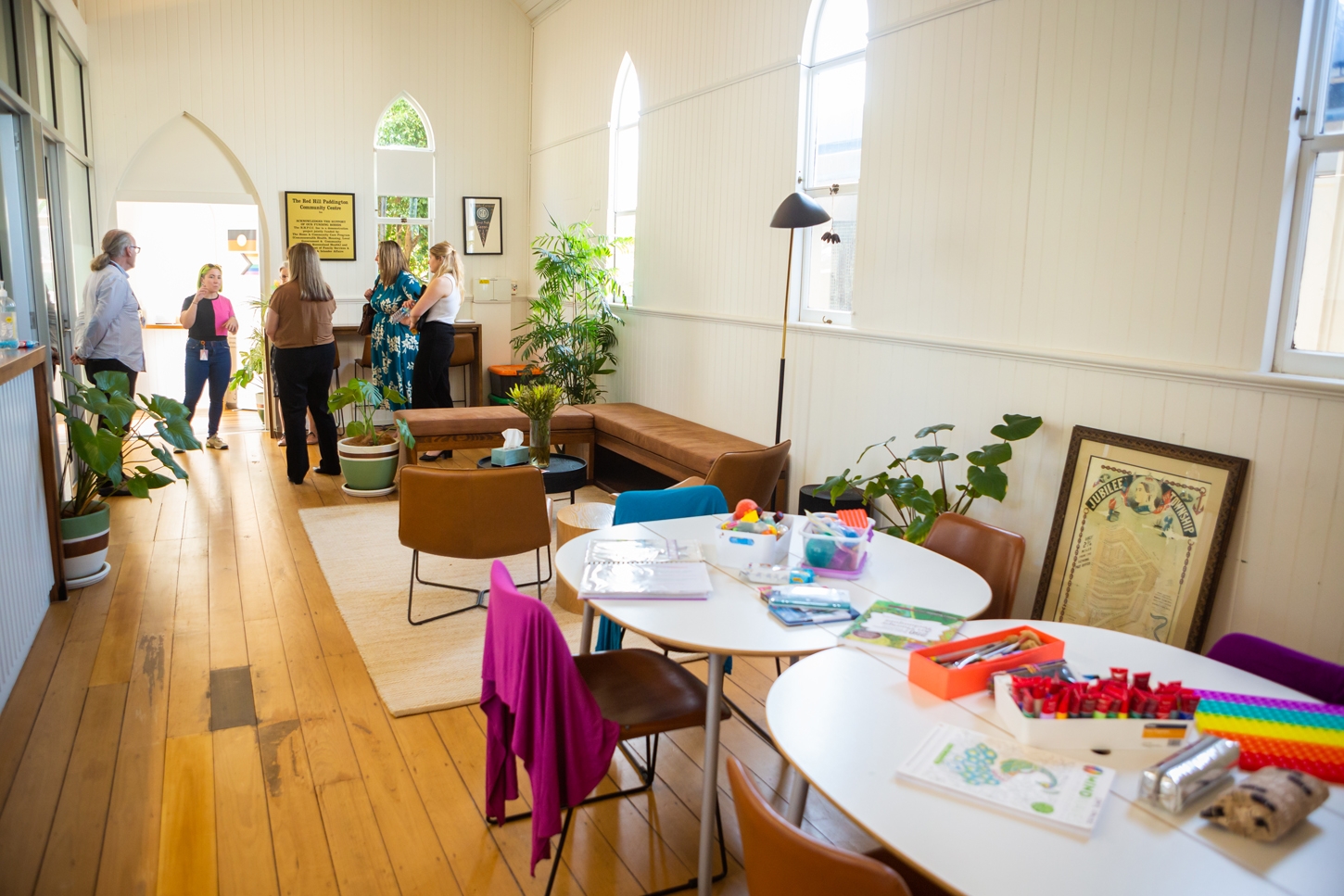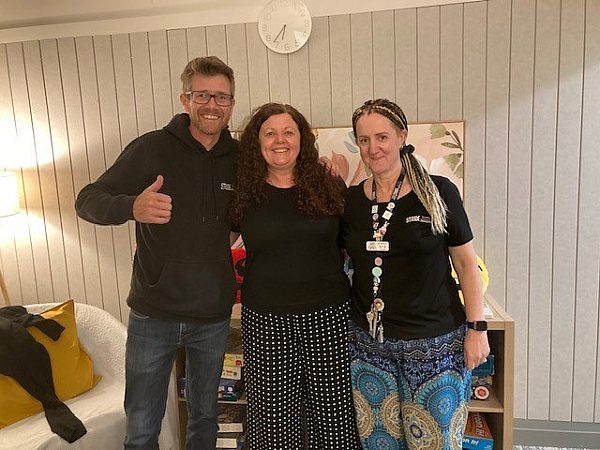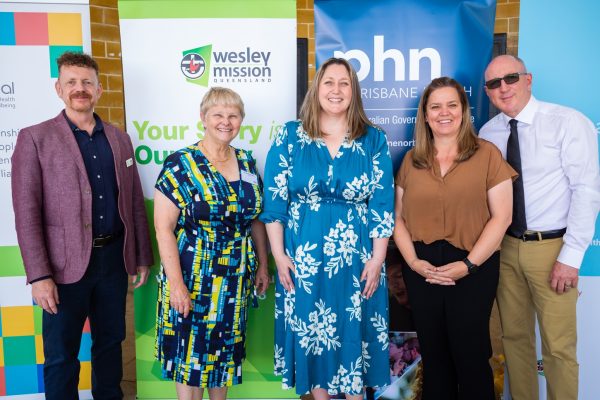I am deserving of help
Ensuring Safe Spaces and continued connection in and for our communities.

Four Safe Spaces across the North Brisbane and Moreton Bay region – one each in Bardon, Caboolture, Strathpine and Redcliffe – are providing meaningful respite from distress in our communities. Together, these spaces comprise the Brisbane North Safe Space Network established to embed more options for safety and enhanced wellbeing across our region.
"How can we help?" – the Safe Space philosophy
A Safe Space is an inclusive and welcoming environment that employs a community-based model of care. Safe Spaces provide an important, accessible, walk-in, after-hours service at a non-clinical location for people experiencing emotional distress to attend to access warm connections and appropriate, reliable support.
Upon arrival, Safe Space guests – as well as their carers or support persons – are greeted by friendly staff who will help them to settle in, offer refreshments and make themselves available to discuss available supports.

Peer Workers are integral to the success of Safe Spaces, selflessly and skilfully drawing upon their own lived experience of distress in providing support to guests.
Unlike in the clinical context, guests are not considered patients and there is no pressure of appointments, excessive paperwork, assessments, diagnoses or wait times. Guests of the Safe Spaces have identified that they derive most value from opportunities for genuine connection and empathy, relieving feelings of isolation, hope, unlearning internalised stigmas around mental health distress, tools and strategies for nervous system regulation, and support in navigating complicated health and community service systems.
When they are ready to leave, Peer Workers can provide support with transport, referrals, phone numbers and resources. Continuity of care is a key consideration for guests and so a follow-up phone call to check on their wellbeing is offered 24 and 72 hours after the visit.
"I love Safe Space. Safe Space has been such a great place for me to come and has given me a place to have an opportunity to talk about everything that is on my mind. The peer support workers here are understanding, kind and compassionate. I have always been welcomed and the workers make sure I am comfortable and like I am deserving of the help."
Over the past 12 months, these kinds of gentle interactions have typified the Safe Space experience in our region.
Hospital emergency departments (EDs) – where individuals will often present when left with few other options – are complex clinical environments that are not always appropriate for people in distress.
Strong attendance and increasing demand this year indicates that Safe Spaces are filling a much-needed gap in the service system for these members of our communities.
Between April 2022 and February 2023, Safe Spacesprovided 3,814 total hours of support to people within our community experiencing emotional distress. 483 guests physically attended one of our Safe Spaces across 1,899 guest visits. 75 per cent of guests have visited one to two times, with repeat visits common.
The number of guests physically attending Safe Spaces, or returning after an initial visit, continues to rise – clear indication that these Spaces have become a trusted location for acute distress management beyond a one-off response to crisis. The proportion of repeat visitors increased from 72 per cent last September to 90 per cent by February this year – creating an alternative, therapeutic environment to which guests are encouraged to return has enabled the avoidance of 176 emergency department admissions.
But the value that Safe Spaces impart to guests goes beyond providing a physical, accessible Space – it is the high quality of service and understanding demonstrated by Peer Workers that is paramount when providing a gap service that can meaningfully improve distress levels and a guest’s lived experience.
Safe Spaces provide not only a physically and emotionally safe, but a culturally safe and identity affirming service for guests identifying as Aboriginal and/or Torres Strait Islander (10 per cent of guests), or as part of the LGBTIQAP+ community (15 per cent of guests).
Safe Space staff capture Subjective Units of Distress Scale (SUDS) data both when guests arrive and depart the Space, which allows for the measurement of the intensity of a person’s distress – and the degree to which they are able to make a difference. 86 per cent of guests showed an improvement in their distress levels (by way of a reduced SUDS score) after a Safe Space stay – R*, who shared their story with us below, is an example of one such guest.
"Safe Space is the only thing I look forward to in my day as I can speak to people without being judged and the workers are kind and caring."

R*'s story
R* (34-years-old, non-binary) found themself in need of a Safe Space during a time of significant distress, presenting with suicidal ideation, thoughts of self-harm and a SUDS of 75.
For R, Safe Space has provided a consistent place to go in times of crisis where they have been able, over multiple visits, to access one-on-one support and create an ongoing wellbeing plan with a dedicated and supportive Peer Worker. R was able to exit the Space with a significant improvement in their level of distress (SUDS of 15).
R – who has a significant history of repeated inpatient psychiatric admissions – disclosed to their Peer Workers that were Safe Spaces not available in the community, they would have attended the ED. R has been able to continue accessing Safe Spaces as an alternative to ED in times of high distress and has resultantly had no patient stays, and only one ED presentation, since becoming one of our recurrent and cherished Safe Space guests.
Quotes from this article were provided by individuals who accessed a Safe Space in our region over the past 12 months.
*Pseudonym used.
